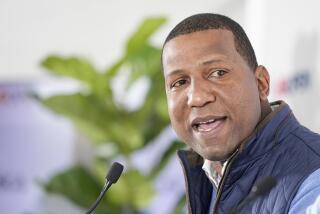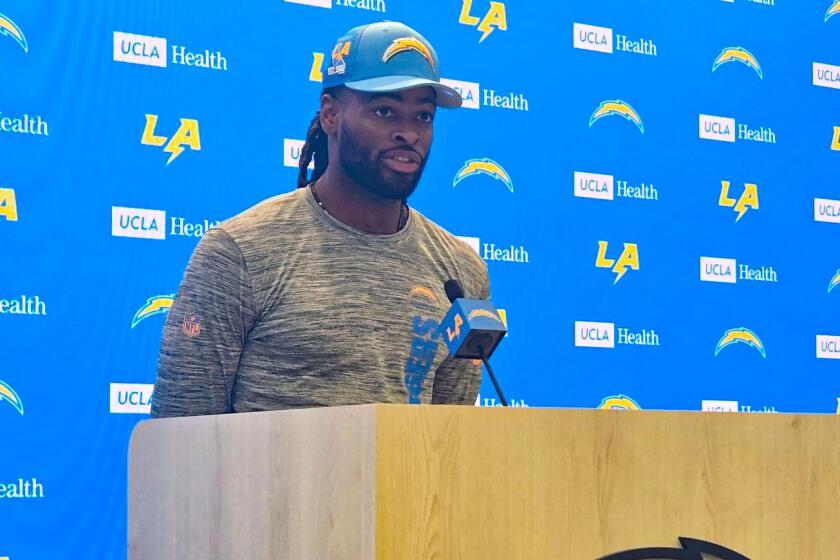Ward Backs Women
- Share via
Lloyd Ward, chief executive officer of the U.S. Olympic Committee and one of the few African American members of Augusta National Golf Club, pledged Monday to “aggressively work” for reform from within, saying he was committed in the coming weeks to “breaking down barriers which exclude women from membership at Augusta.”
In a letter sent Monday to Martha Burk, chair of the National Council of Women’s Organizations, which has been pushing Augusta National to admit female members, Ward said he is “working with others who are members of Augusta National Golf Club who share the belief that the organization should include women in its membership ranks.”
Ward also said in the letter that the USOC stands on a platform of inclusion, fair play, sportsmanship and a “level playing field for our athletes,” and that platform “is also the cornerstone of my own values and ideals.”
The letter, coming just days after Citigroup chairman Sanford I. Weill became the first Augusta National member to publicly offer the women’s group his guarded support, provides added evidence of a push for change within the club’s locker room. Augusta National, site each April of the Masters, has about 300 members, including chief executives of some of the country’s best-known companies. A few black men are members, the first invited to join in the 1990s. A woman has never been a member. Women can play at Augusta as guests.
Burk welcomed Ward’s letter, saying late Monday, “I’m gratified Mr. Ward has come out so strongly in favor of change at Augusta and in favor of fairness. I’m confident his stand will empower other CEOs to follow his lead.”
But the timing and content of Ward’s letter also underscores just how delicate are the sensitivities, and how keen the risks, for a public figure who has opted to remain a member of a private club that has a long history of exclusionary membership policies.
The four-paragraph letter clearly marks the strongest formal statement to date from within club membership about the possibility of change. The issue has been percolating for months, intensifying since Aug. 30 when, in a bid to avoid pressure to admit female members, Augusta National announced it would forgo commercial television sponsorship--from Citigroup, IBM and Coca-Cola--for the April 2003 Masters.
But the letter does not say how Ward--or others--intend to effect change. Nor does it lay out a timetable.
Meantime, Ward has prided himself on being an aggressive, out-front advocate for bold leadership, citing his own story as a model of what is possible to achieve in the United States. He was a Fortune 500 CEO, with the Maytag Corp., before becoming the USOC’s chief executive officer last year.
But Ward has apparently dared not go so far as to even speak with Burk. She said, “I have not talked to him personally.” As he has consistently in recent weeks, Ward declined Monday a request for comment on the topic of Augusta National.
And by releasing the letter on Monday, not beforehand, Ward allowed himself the relative safety of following the lead of not only one but two other high-profile executives--both of whom plunged before him back into the public debate over Augusta National’s policies.
After the release of the Citigroup statement on Weill’s behalf late last Friday, former Ford Motor Co. president Harold A. Poling said on Saturday he expects Augusta National to invite a woman to join and would prefer it be “resolved shortly.” The Citigroup statement was first reported in the New York Times, which also quoted an anonymous Augusta member as saying that “maybe 20 members” were working for change. Poling’s remarks were first reported in the Atlanta Journal-Constitution.
It’s far from clear whether resolution is forthcoming in the near future.
In a sense, Ward’s letter adds little to remarks he made in April, when he told USA Today: “I want to have influence from the inside. I want to talk to members of Augusta and say, quite frankly, that’s [admitting African Americans] simply not enough. You’ve got to have a broader membership, and that includes women.”
More to Read
Go beyond the scoreboard
Get the latest on L.A.'s teams in the daily Sports Report newsletter.
You may occasionally receive promotional content from the Los Angeles Times.










